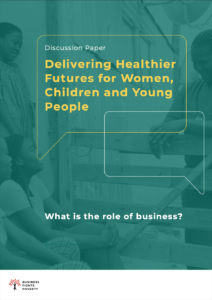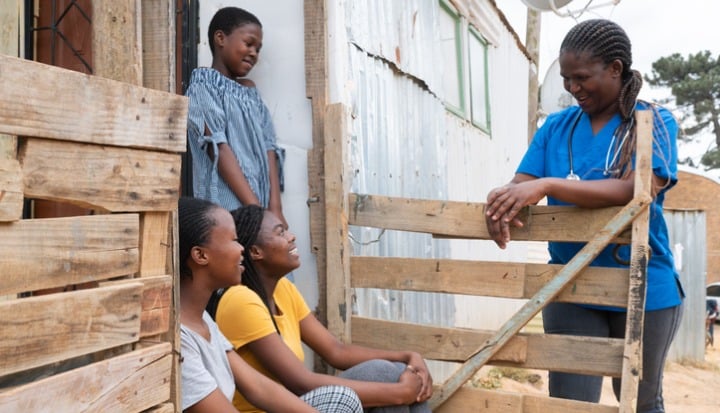The Future

Imagine for a moment a world in which every woman, child and young person enjoyed their right to the highest attainable standard of health, regardless of where in the world they lived.
Pregnant women in the poorest communities are cared for by qualified midwives and healthcare professionals, with access via digital apps to the latest in diagnostic technologies.
Women living in remote areas who suffer labour complications are treated with NASA-inspired technology, and the life-saving drugs needed to stem postpartum haemorrhage are always on hand thanks to cutting-edge stock monitoring systems and drone delivery.
All children have nutritious food, routine vaccinations, clean water and sanitation, so preventable death in the under-fives is all but eradicated.
| Business Fights Poverty proudly supports the Global Financing Facility (GFF)’s Deliver the Future campaign as private sector advocacy partner.
GFF works with governments, civil society, communities, youth advocates and health workers to realise the right to health for women, children and young people in 36 lower-income partner countries. Continued investment in the GFF will enable 250 million women, children and adolescents to access lifesaving health services, helping build more resilient communities. |
Sexual health information is designed together with young people and is easily available on their mobile phones, so that they are informed of their options and in control of their futures. Local clinics provide contraception without stigma.
Communities and economies thrive as individuals are able to learn and develop their potential, free from hunger and uninhibited by ill-health.
The Present
All of the interventions in the imaginary scenario above exist today, and are already saving lives in the poorest communities. However, there is a long way to go to realise the right to health for all women, children and young people. Each year, 4.5 million mothers and babies die avoidable deaths during pregnancy, childbirth and in the first few weeks of life. What is more, one in five children globally experience stunting due to malnutrition, with disastrous impacts for their health, learning and earning potential. Weak health systems are under strain and funding is insufficient, as lower-income countries struggle with the high costs of debt, inflation, a food and energy crisis and the impacts of conflict and climate change.
As with many social impact challenges, the scale of the health crisis for women, children and young people requires governments to lead, but they cannot deliver all the solutions alone. The private sector, along with civil society partners, has a critical role to play in delivering a healthier future. After all, improvements in the health of women, children and young people benefit us all: our workforce, our communities, our economies and our long-term sustainable development.
A role for businesses in every sector
Business Fights Poverty’s discussion paper “Delivering Healthier Futures” reveals the wide-ranging opportunities for social impact in this area, not just for businesses in the medical and pharmaceutical sectors, but for businesses in industries as diverse as telecoms and digital technology, transport and logistics, the garment sector, food and agriculture, cosmetics, construction and the energy sector, as well as private investors. It calls for the adoption of a rights-focused, government-led and systems-based approach that prioritises inclusivity, equity and broad access to health care.
The paper provides many inspiring examples of action of businesses working through their core operations and value chains, philanthropic activities and advocacy networks to improve the health of women, children and young people within their business ecosystems. For example:
- Core business and value chains: Primark are working with factories in India in Bangladesh to support the physical and mental health of garment workers, for example by providing menstrual health and hygiene information and training peer-support counsellors.
- Philanthropy: Through its philanthropic initiative, MSD for Mothers, MSD is investing $500 million to reduce maternal mortality, positively affecting over 20.8 million women and 160 million people in the U.S., Nigeria, India and Kenya.
- Advocacy: Cosmetics company Avon raises awareness of gender-based violence, and supports charities including Lawyers Against Abuse who work with the police, judiciary and policymakers on systemic change in South Africa.
Three levers to accelerate action
The discussion paper also highlights three important levers through which the private sector can help accelerate access to health care. These are:
- Inclusive innovation: Both multinationals and SMEs are leading with innovations that make health care solutions more accessible for the most vulnerable communities. For example, Bayer is investing in production of long-active and non-hormonal contraception specifically for LMIC markets, and innovative start-ups such as Ambulex are providing affordable access to ambulances in low-income communities in Kenya.
- Collaborating to strengthen primary health care: The private sector plays a significant role in providing primary health care services through, for example, community pharmacies and private hospital services, buildings and infrastructure, education and training, and data technology. Greater dialogue and collaboration with governments, as is currently underway in Malawi, can help to align private sector action with public sector priorities.
- Maximising finance: Given the funding shortfall, we need to be creative to increase money for health, as well as increasing the impact of the money that is available. For example, the Global Financing Facility works with 36 partner countries to strengthen national plans for women, children and adolescents’ health, provide technical assistance, catalyse and align investments from other donors, and bring effective local solutions to scale. Blended finance is used by the Health Finance Coalition and GAIN’s Nutritious Foods Financing Facility to mitigate investment risk and attract private sector funds.
A thriving area for investment and aligned action
The discussion paper highlights the significant potential for change and the many different entry-points for businesses to leverage their specific capabilities, networks and resources, as well as providing a wide variety of examples of action. Many – perhaps even most – of the solutions we need to deliver healthier futures for women, children and young people already exist, but now we must make them available to everyone, including those in the poorest countries and communities.
A healthier future is possible, if we work together to deliver it.
Editor’s note: To celebrate the launch of this discussion paper, Business Fights Poverty is co-hosting a webinar with the Global Financing Facility on Wednesday 6 March, as part of our Global Equity Summit. We hope you will join us. Please click here to register, using promo code GES24GFF for a free ticket.
To download the discussion paper, click here.










